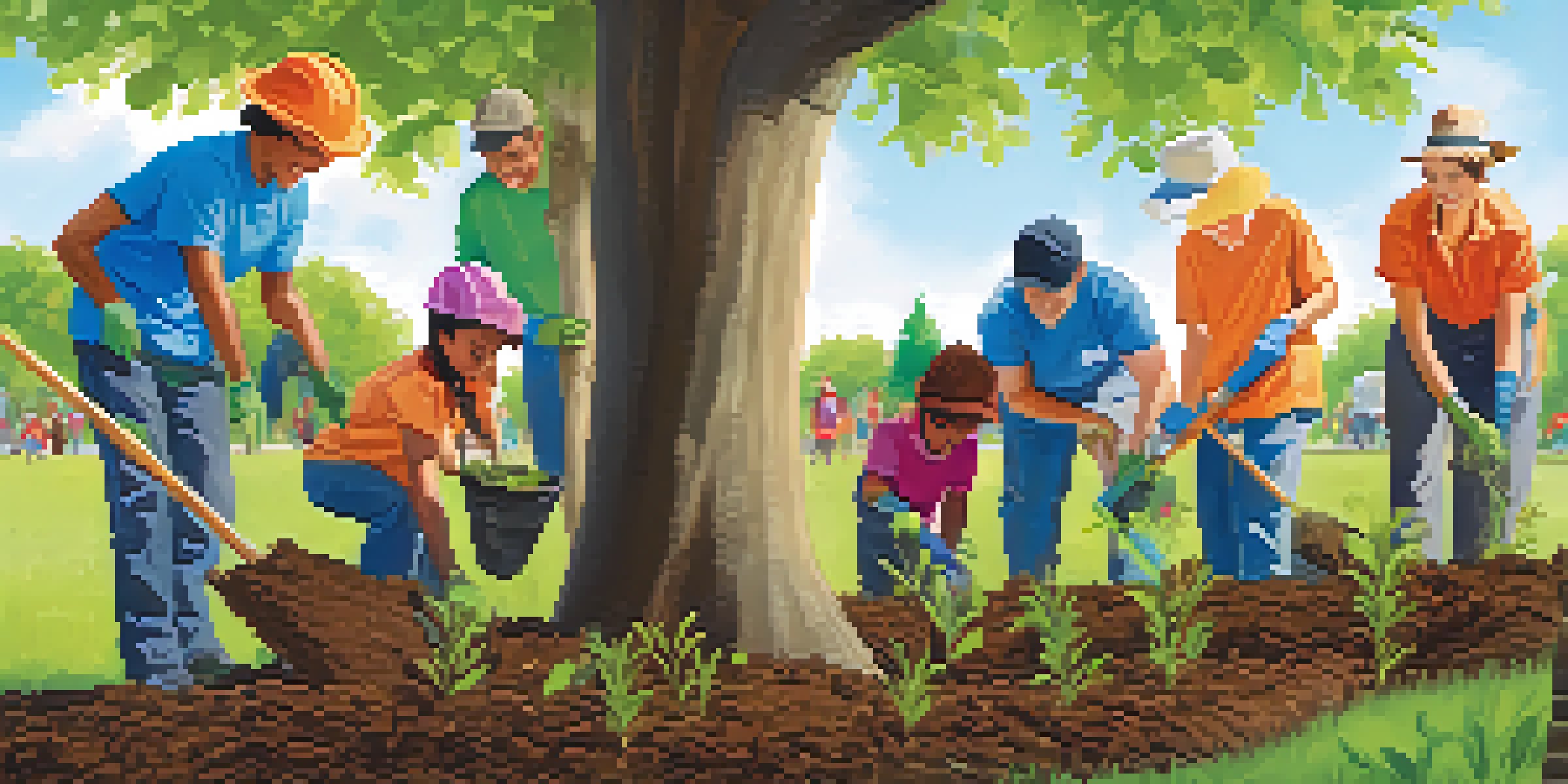Community Involvement in Tennessee’s Conservation Initiatives

The Importance of Community in Conservation Efforts
Community involvement is vital for successful conservation initiatives in Tennessee. When individuals and local groups come together, their collective efforts can lead to significant environmental improvements. This collaboration often leads to a shared sense of responsibility and ownership over local natural resources.
The environment is where we all meet; where we all have a mutual interest; it is the one thing all of us share.
In Tennessee, this sense of community translates into various projects, from reforestation to wildlife habitat restoration. For example, local citizens can often be found participating in tree-planting events that not only beautify the landscape but also enhance biodiversity. These initiatives exemplify how community action can lead to lasting environmental change.
Moreover, involving the community helps to raise awareness about conservation issues. When people understand the challenges facing their environment, they are more likely to take action. Through educational programs and hands-on activities, communities in Tennessee are becoming more informed and engaged in conservation efforts.
Successful Local Conservation Projects in Tennessee
Tennessee has seen numerous successful local conservation projects driven by community involvement. One notable example is the Tennessee River Clean-Up, where volunteers come together annually to remove debris from the riverbanks. This event not only cleans up the river but also fosters a sense of camaraderie among participants.

Another impactful initiative is the Great Smoky Mountains National Park's 'Adopt-a-Trail' program. Local residents take it upon themselves to maintain specific trails, ensuring they remain accessible and beautiful for visitors. This kind of project showcases how community members can directly impact their local environment while also promoting tourism.
Community Drives Conservation Success
Successful conservation initiatives in Tennessee rely heavily on community involvement and grassroots efforts.
These projects highlight the power of grassroots efforts in conservation. When communities rally around a common cause, they can achieve remarkable results, creating a cleaner, more sustainable environment for everyone.
The Role of Education in Conservation Engagement
Education plays a crucial role in fostering community involvement in conservation. Various organizations in Tennessee offer workshops and training sessions to teach residents about local ecosystems and conservation practices. This knowledge empowers individuals to make informed decisions that benefit their environment.
Volunteers do not necessarily have the time; they just have the heart.
For instance, programs like Tennessee’s ‘Conservation in the Classroom’ provide students with hands-on experiences in nature. By engaging young people early on, these initiatives cultivate a lifelong appreciation for the environment. Educated citizens are more likely to become active participants in conservation efforts.
Furthermore, educational campaigns can inspire community leaders to prioritize environmental issues. When leaders understand the importance of conservation, they are more likely to support policies and initiatives that protect natural resources, ultimately benefiting the entire community.
Partnerships Between Communities and Organizations
Strong partnerships between community members and conservation organizations are essential for effective initiatives. In Tennessee, organizations like The Nature Conservancy work closely with local groups to enhance conservation efforts. These partnerships leverage resources, expertise, and manpower for maximum impact.
For example, when community members team up with organizations for habitat restoration projects, they can address specific local needs. This collaboration ensures that efforts are not only effective but also tailored to the unique characteristics of the area. It’s a win-win situation where both sides benefit from the exchange of knowledge and skills.
Education Empowers Local Engagement
Educational programs equip residents with knowledge, fostering informed participation in conservation efforts.
Additionally, these partnerships can help secure funding and resources necessary for larger projects. By working together, communities and organizations can access grants or sponsorships, amplifying their conservation reach and effectiveness.
Challenges Facing Community-Driven Initiatives
Despite the successes, community-driven conservation initiatives in Tennessee face challenges. One significant issue is the lack of funding and resources, which can hinder project implementation. Without adequate financial support, even the most passionate volunteers may struggle to make a lasting impact.
Moreover, community engagement can fluctuate over time. Factors such as changing demographics or shifting priorities can lead to a decline in participation. Maintaining enthusiasm and involvement requires continuous outreach and education to keep the community informed and motivated.
Lastly, coordinating efforts among various groups can sometimes be challenging. With multiple organizations and stakeholders involved, it’s crucial to ensure everyone is on the same page. Effective communication and collaboration are key to overcoming these hurdles and driving successful conservation efforts.
The Impact of Volunteerism on Conservation Success
Volunteerism is at the heart of many successful conservation initiatives in Tennessee. Countless residents dedicate their time and energy to various projects, from clean-ups to educational outreach. This spirit of volunteerism not only helps the environment but also strengthens community bonds.
For example, volunteer-led organizations often host events that bring people together for a common cause. These gatherings foster a sense of community and create lasting friendships among participants. The camaraderie built through shared experiences amplifies the impact of conservation efforts.
Partnerships Enhance Conservation Impact
Collaborations between communities and organizations maximize resources and effectiveness in conservation projects.
Moreover, volunteers often serve as ambassadors for conservation, spreading awareness and encouraging others to get involved. Their enthusiasm can inspire friends and family to join in, creating a ripple effect of community engagement that benefits the environment.
Future Directions for Community Involvement in Conservation
Looking ahead, there are exciting opportunities for enhancing community involvement in Tennessee’s conservation initiatives. Increasing the use of technology, such as social media and mobile apps, can help connect residents with local projects and events. This approach can streamline communication and boost participation.
Additionally, fostering intergenerational collaboration can strengthen conservation efforts. Engaging both younger and older community members ensures a diverse range of ideas and experiences are brought to the table. This collaboration can enrich discussions and lead to innovative solutions for local environmental challenges.

Ultimately, the future of conservation in Tennessee lies in the hands of its communities. By continuing to build on existing initiatives, fostering partnerships, and encouraging active participation, Tennesseans can create a more sustainable future for their environment.